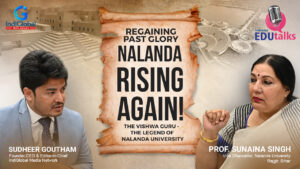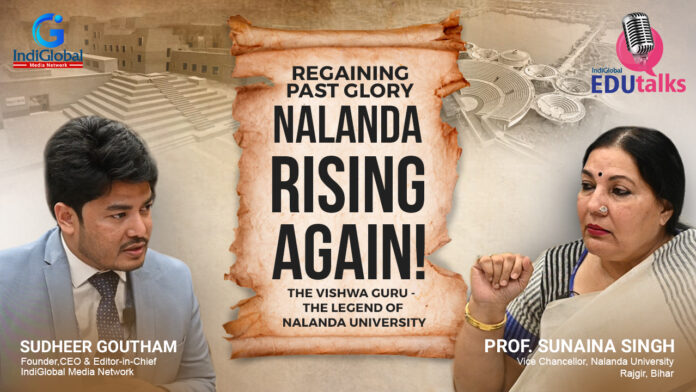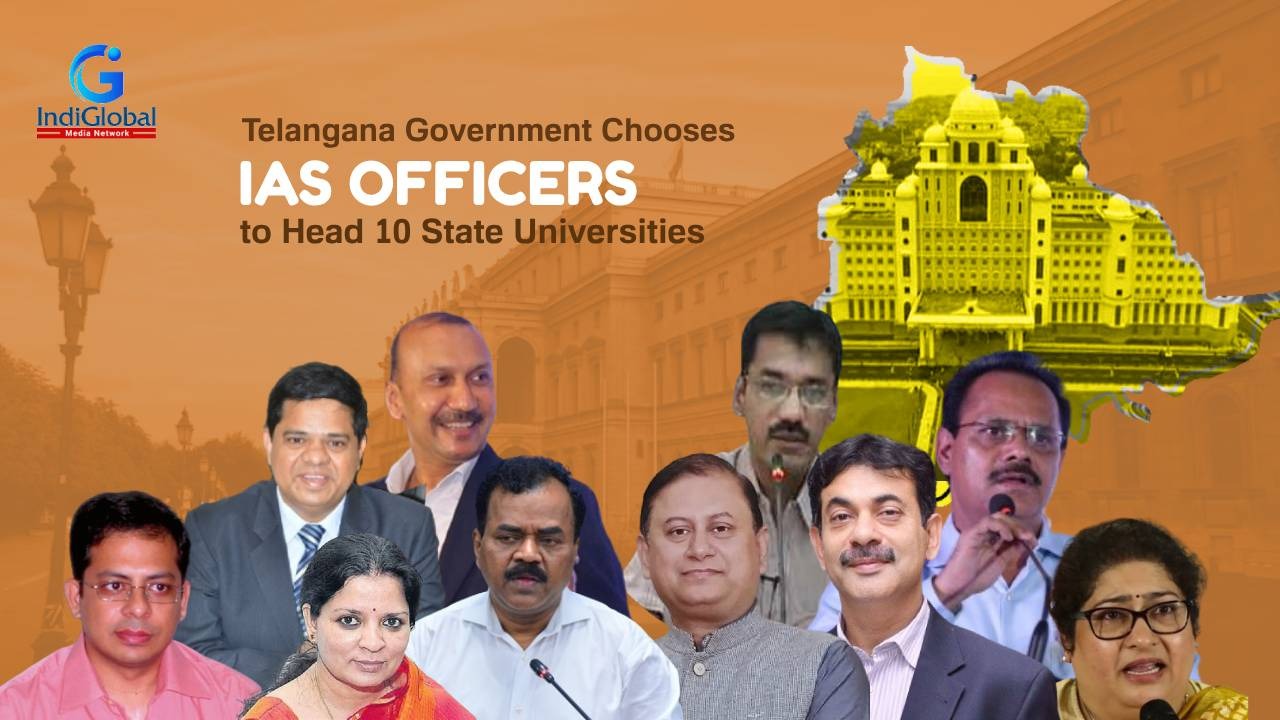Nalanda University has an illustrative history lasting 8 centuries and was known as the Vishwa Guru, patronized by many royal kings. Seventeen countries of East Asia summit supported Nalanda in its creation. Professor Sunaina Singh, Vice-Chancellor, Nalanda University, Rajigir, Bihar speaks to IndiGlobal Media Network on Edu-Talks about rebuilding Nalanda University and its national importance and has a dedicated wing under Ministry of External Affairs, Government of India.
Q. What are the steps being taken by the present adminsitration to restore its past glory?
We must remember that we are diverse through the long corridor of history, nearly 1600 years. We came into existence by the Act of Parliament and we are truly international. Seventeen countries of East Asia summit supported Nalanda University in its creation. We have students from thirty-one countries on campus today. The university itself is a lab. My vision for Nalanda is that we should set high international standards in education and create and sustain knowledge that will enable students to embark on a unique empirical journey of learning. We are proving knowledge without borders. We need to cross all the barriers. Today sharing of knowledge is very important and thereby a congruence of the culture can be seen here.
 Q. How do you look at Nalanda University being recreated? Will we get back that credit?
Q. How do you look at Nalanda University being recreated? Will we get back that credit?
Nalanda University continues to be in the collective memory as the first University for learning. To begin with the University has liberated knowledge from the cone of Geography to that of spirituality. The uniqueness of Nalanda University is that we formulate the linkages with the other countries. We are constantly evolving and growing. And we must look at the relevance of our courses. We must look at how we reinvent them. We need to look at how we maintain the global standards? How do we maintain our infrastructure? The commitment of the Government of India is to promote Nalanda University and ensure that we grow and do well. We have the full support of the honorable Prime Minister Narendra Modi.
Q. How are the mentors/ Professors being brought on board? What is the Screening Procedure?
Mentors/ Professors are the most important aspect of the University because institutions are known by them. We endeavor to get the best from the world over. But the challenge I find on the ground here is that we are situated in the state of Bihar in a small and spiritual place called Rajgir. Getting good faculty to move to Bihar has been a challenge. And this will continue to be a challenge. To overcome this challenge, the first thing that we should do is to create infrastructure for the faculty for their research and accommodation. We advertise for the post just as other universities do. And they have to go through a rigorous interview process. Where we get experts from outside, the chancellor nominee, and experts from the committee to evaluate them. We keep our faculty inspired, so that they continue to do their research, redefine their knowledge, and continue to lead the students. They have to conduct research for their extension.
Q What is the screening process for students in this modern and recreated Nalanda?
We have a three-layered process for the screening of students. As a large number of our students come from overseas and there are procedures in place for their application and selection. We look into their Statement of Purpose, relevant choice of subjects and the courses that they are opting for. Our courses are organized and established where students from any stream or at any age can apply. We look at what their interest is in studying at Nalanda University. Be it any stream it’s open to everyone. And most important is quality has to be ensured because higher education is all about ensuring quality teaching and quality students.
Q. What financial resources are required for the University to function seamlessly?
We are constantly compared to the ancient institution but the times are very different. That was almost 1600 years ago. Royal patronage was very important at that time. Be it Samudhra Gupta or his legacy, Kannauj King, Harshwardhan dynasty and many other supported the university. Education was completely free. When we fast forward to 21st century, complete free education may not be possible.
Q What are the highlights of Nalanda University as we can see certain structures are coming up?
The Nalanda Campus is a lab by itself. It has a very unique way of defining ourselves. Our structures will define the kind of education that we are looking at and this is the remodeling of education and Nalanda is the University of the future. Our structures are created in such a way where novel thought comes from all directions. Our campus itself is built to welcome knowledge and philosophy. We need to learn and redefine. We have very innovative courses which are very different from the usual courses that you find in any university. Because I personally audit the courses and look at its relevance. We have a very good academic council that helps us in adding the innovative profile of Nalanda.
Q What steps are being taken to improve the connectivity to the University?
The kind of natural body and the green campus we are creating is a unique transformative philosophy of learning. The posible connectivity is either through Gaya or Patna. Gaya is about 75 Kilometers and about 100 kilometers is Patna. We need to drive from there and that’s another challenge that we need to look for. The honorable Chief Minister was trying to get the airline closure to Nalanda.
Q Would you like to give any message to our viewers and the youngsters who are looking at their career and future?
My advice to youngsters is to constantly keep innovating themselves. How commitment plays a very important role, how knowledge needs to be redefined. We need to refine our research profile. Students have to be in quest of knowledge. Today with our honorable endeavor we do have startups and I think even students from different fields can innovate and look at how to create and decimate new knowledge, relevant to society and to future challenges. It’s very important to be positive in mind. Life is not easy but we have to find ways to be positively deal with life challenges.








